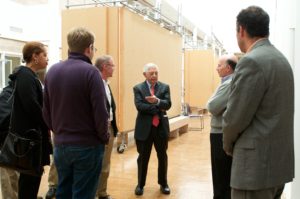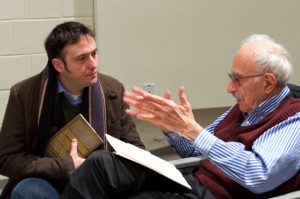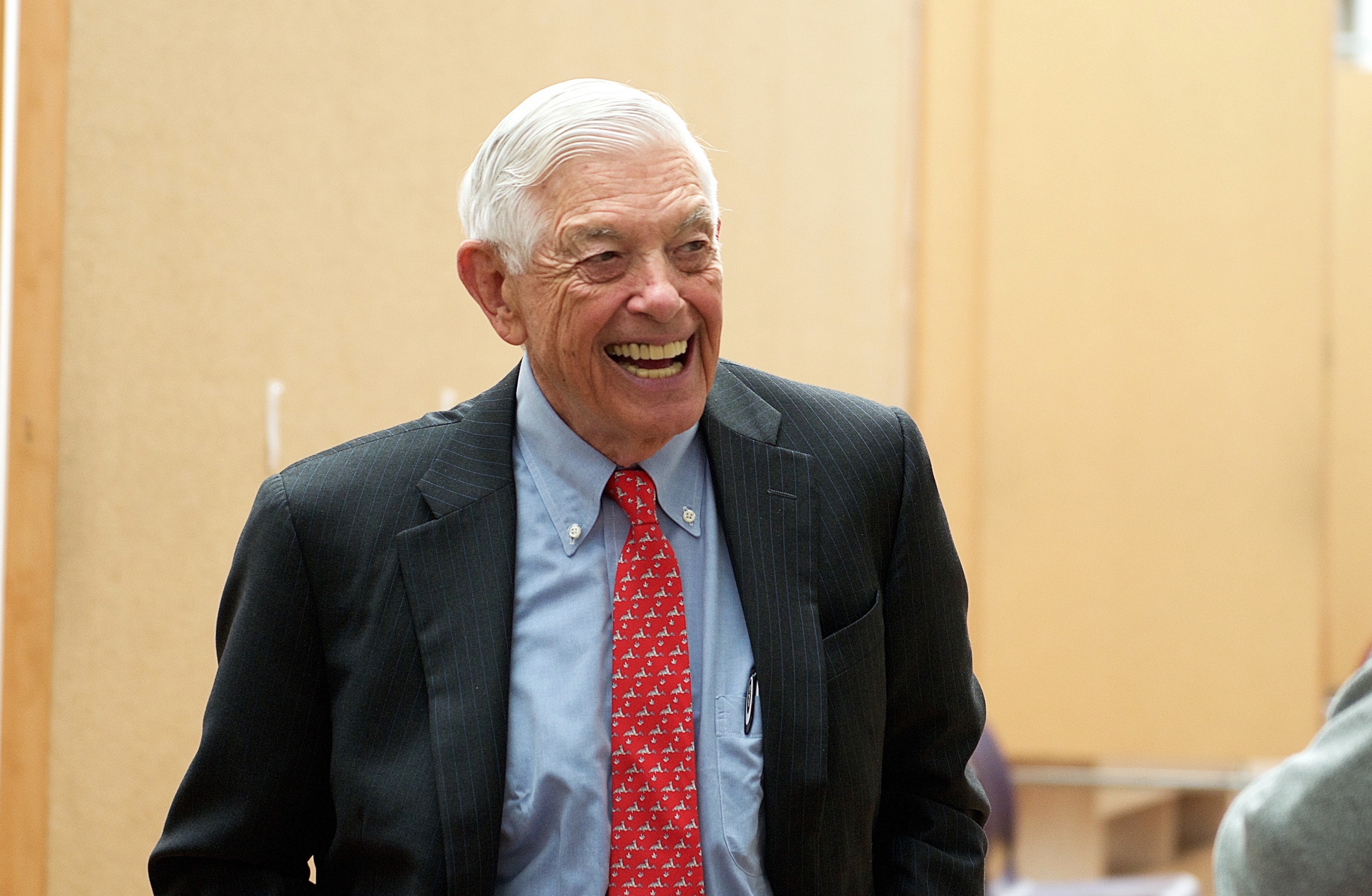Hugh McColl nudges the toe of his black dress shoe just over the edge of the auditorium stage.
A podium cannot contain or constrain him – the stage itself hardly can. The tip of his shoe hovers mid-air as he moves closer to the students just below him, drawing out their questions.
The former CEO and chairman of Bank of America covers great swaths of business and banking history in his talk, speaking about the impact of integration on the South – good for growth – and how he and others fueled their businesses and their careers.
“The ones who really succeeded were the driven people who made it happen,” he tells the students.
McColl met with students as part of the Dowd Initiative, created by the Department of History. Supported by the Dowd Foundation, the department offers courses on historical themes of business interest; in particular the impact of capitalism on regions and society from diverse historical perspectives. Guest speakers are bringing their points of view, while professors teaching the classes are linking their research and their teaching.
“The Dowd program creates a new focus in the department on economic and business history, to go along with our courses on cultural, social, and political history,” says Jürgen Buchenau, department chair.
“It has also funded the creation of history and liberal studies courses that involve quantitative as well as qualitative reasoning,” Buchenau says. “Being able to work with numbers and statistics increases the employment opportunities of our graduates.”
 The effort started as a conversation about the value of history majors’ ability to analyze and communicate, and the need to connect American higher education and the practical needs of the American workplace.
The effort started as a conversation about the value of history majors’ ability to analyze and communicate, and the need to connect American higher education and the practical needs of the American workplace.
This semester’s course topics range from African-American entrepreneurs through capitalism and slavery to the history of capitalism in the American South. While the courses are individual in their focus, they come together around guest speakers’ topics and UNC Charlotte research.
“My ‘Slavery & Capitalism’ seminar relates directly to my on-going research on the history of slavery, race, and emancipation,” says John David Smith, Charles H. Stone Distinguished Professor of American History.
“The class encourages students to think about the costs – both in humans and in financial capital – of the systematic exploitation of persons torn from Africa by the Atlantic slave trade over time and place in the Antebellum South,” Smith says. “Historians consider the nexus between slavery and capitalism an especially relevant topic today, one connecting such key topics as racial violence, reparations, and historical memory.”
Shep McKinley, senior lecturer, draws upon his 2014 book, Stinking Stones and Rocks of Gold: Phosphate, Fertilizer, and Industrialization in Postbellum South Carolina, as a foundation for his course, ‘Capitalism in the South.’
“Our class begins our investigation of capitalism in – and behind the founding of – Jamestown in 1607 and ends in the Hugh McColl era, with New South Charlotte’s rise to become a major player in banking,” McKinley says. “Just as my book investigates the tensions and connections between race and capitalism, so too does our class look at slavery, the Civil War, Jim Crow, and the civil rights struggle as they relate to southern businesses and the economy.”
In associate professor Sonya Ramsey’s class, she turns to her research interests and expertise in African American history, women’s history, and the history of education.
“When I developed my course, ‘The African American Entrepreneurial Spirit,’ I drew upon several aspects that related to my research,” she says. “In my course, we discuss the experiences of African American entrepreneurs as they created their businesses. We also discuss their impact upon educational development, civil rights, and philanthropy. My course also explores other motivational factors for business development. During segregation, African American business leaders created businesses to help contribute to the social and cultural betterment of African American communities through economic development.
Guest speakers brought to life the academic subjects studied in class. For Ramsey, two particularly relevant speakers with new voices and perspectives were Juliet E. K. Walker, who helped create the field of African American business history, and Tiffany Gill, who has done groundbreaking research into the political and civil rights activism of African American hairstylists.
“Dr. Gill’s work, for example, challenged students to rethink their prevailing ideas of who activists were,” she says. “These women were not traditional activists who marched in the streets but they relied upo n their independence as autonomous business-owners to fight for social justice.”
n their independence as autonomous business-owners to fight for social justice.”
Another speaker this semester was Seymour Drescher, one of America’s foremost authorities on the economics of North American slavery, comparative slavery, and abolition.
“All the speakers touched on the broad nature of capitalism and human progress,” Smith says. “In the case of Professor Drescher, who spoke on slavery and capitalism, the students gained a clear sense of the human costs of bonded labor and the power of the nexus of racial hierarchies and labor exploitation. My seminar students found inspiring Dr. Drescher’s passion and commitment to underscoring slavery’s deep roots in American capitalism and the deleterious long-term implications of racial slavery on African American life and labor.”
For McKinley’s students, the speakers helped make the linkages between the eras and the materials.
“It’s one thing to read about the business of slavery, the innovative Madam C.J. Walker, or Bank of America’s rise in North Carolina, but it’s another thing entirely for the students to hear the experts discuss the topics and answer their questions in depth,” he says.
The first courses in the series considered the global history of capitalism, American business history, and the history and impact of capitalism on American food production. Past speakers included entrepreneurs and corporate giants. Special among them was Roddey Dowd Jr., CEO of Charlotte Pipe & Foundry Company and supporter of the initiative.
“We are grateful for the support of Mr. Dowd and the Dowd Foundation,” Buchenau says. “The study of capitalism is important for everyone alive today, as our economic system affects virtually every aspect of our lives. Studying capitalism in historical perspective allows students to understand how our current economic and social realities came to be.”
Words and Images: Lynn Roberson. Pictured: Hugh McColl (top) and Seymour Drescher, who spoke to classes, among other speakers.








